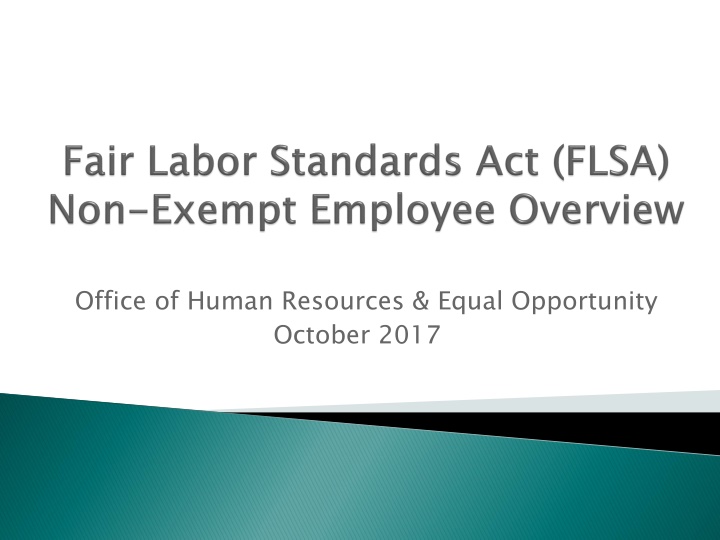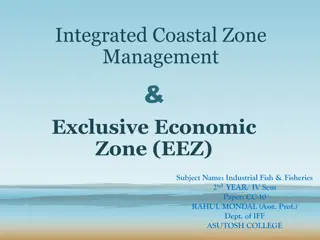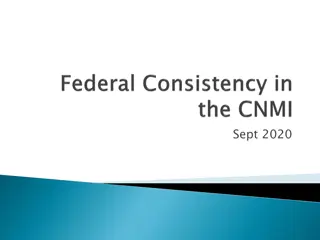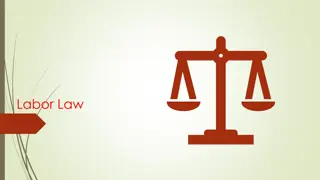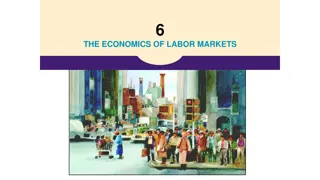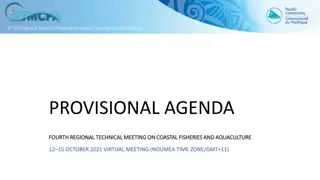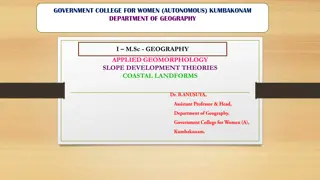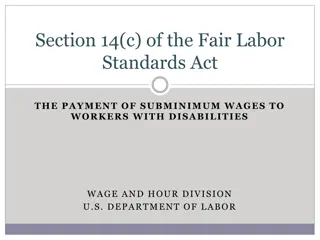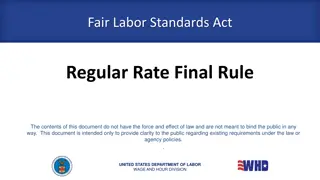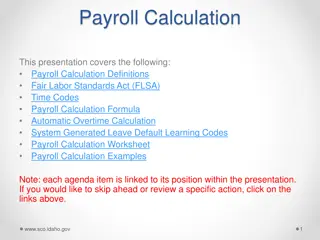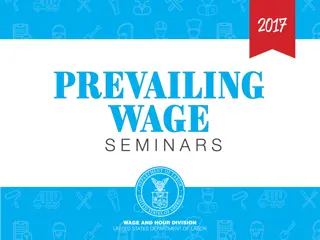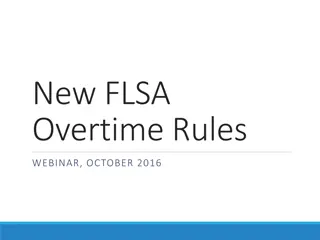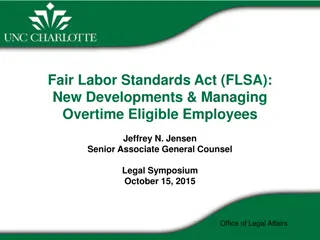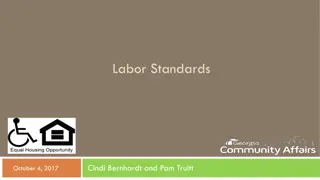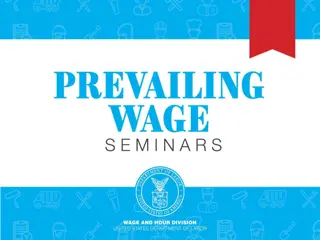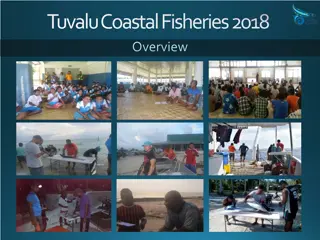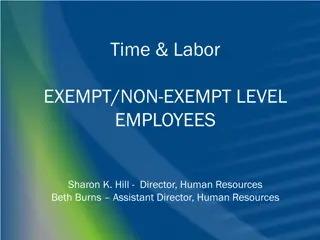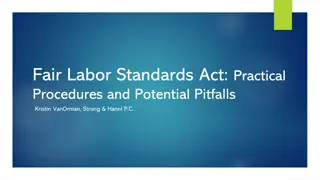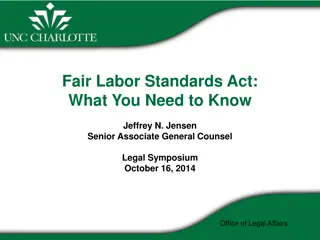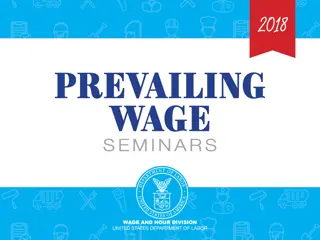Fair Labor Standards Act (FLSA) Overview at Coastal Carolina University
This presentation provides guidance on the Fair Labor Standards Act (FLSA) and its administration at Coastal Carolina University. It covers important aspects such as minimum wage, exempt vs. non-exempt classification, workweeks, overtime compensation, and more to ensure compliance and fair treatment in the workplace.
Download Presentation

Please find below an Image/Link to download the presentation.
The content on the website is provided AS IS for your information and personal use only. It may not be sold, licensed, or shared on other websites without obtaining consent from the author.If you encounter any issues during the download, it is possible that the publisher has removed the file from their server.
You are allowed to download the files provided on this website for personal or commercial use, subject to the condition that they are used lawfully. All files are the property of their respective owners.
The content on the website is provided AS IS for your information and personal use only. It may not be sold, licensed, or shared on other websites without obtaining consent from the author.
E N D
Presentation Transcript
Office of Human Resources & Equal Opportunity October 2017
This presentation is intended to provide general guidance regarding the Fair Labor Standards Act (FLSA) and its administration at Coastal Carolina University. This presentation is not considered to be a contract and is subject to change and/or interpretation as deemed necessary by Coastal Carolina University. This presentation is intended to provide general guidance regarding the Fair Labor Standards Act (FLSA) and its administration at Coastal Carolina University. This presentation is not considered to be a contract and is subject to change and/or interpretation as deemed necessary by Coastal Carolina University. This is not intended as legal advice and is primarily for the purpose of general guidance. This is not intended as legal advice and is primarily for the purpose of general guidance.
Fair Labor Standard Act Why is this information important to you?
Non-Exempt: Covered by FLSA Exempt: Not covered by FLSA
Effective July 24, 2009, the minimum wage was established at $7.25/hour. Non-exempt employees must receive at least that rate per hour. The new FLSA rules do NOT impact your current pay rate.
Vacation, Holiday, Severance or Sick Pay Meals or Rest Periods Premium Pay for Weekend or Holiday Work Pay Raises Immediate Payment if Separated from Employment
A work week is 7 consecutive, 24 hour periods. CCU s work week begins at 12:01 am Sunday and ends at midnight the following Saturday. Each work week stands by itself in determining overtime compensation for Non- Exempt employees.
Certain CCU sworn law enforcement officers may work a variable schedule. A 14-day work period (80 hours) that begins at 12:01 am Sunday and ends 14 days later at midnight.
For most employees, the FLSA designation of exempt or non-exempt depends on: (a) how much they are paid; (b) how they are paid; and (c) what kind of work they do. More details to follow.
Non Non- -Exempt Exempt Exempt Exempt Receives overtime Does not earn overtime Paid for the hours worked Paid to get the job done no matter how many hours worked in a work week Paid on a fixed salary basis May be paid on an hourly or salary basis (subject to overtime) Does not meet any of the exemption tests Meets one or more of the exemption tests
Two both tests to be designated as exempt. 1. Salary Test Employees must make at least $23,660 per year ($455 per week). AND 2. Duties Test Falls into at least one of the following categories: Executive, Professional (Creative or Learned), Administrative, Computer Professional or Highly Compensated Two- -Prong Test Prong Test Positions must pass *Job titles do not determine exemption status.
Must receive 1 1/2 times their regular rate for all hours worked in excess of 40 in a work week (except certain sworn law enforcement officers). Overtime is based on hours worked. Holidays and leave time are not included. Salaried, non-exempt employees should report hours between 37.5 and 40 (if worked), even though there is not additional compensation.
All time employees are required to be on duty or at a prescribed workplace and permitted to work. Includes work performed on or away from premises if supervisor knows or has reason to believe work is being performed. When employees arrive to work early and begin working. Work performed after hours including checking email, accessing CCU systems, etc.
When employees are required to attend training, lectures, meetings, etc. All hours spent traveling in one day by a non- exempt employee will be compensable for purposes of determining overtime hours regardless of time of day or day of the week. Refer to FAST-HREO-216 for information on overnight travel. When employees are required to remain on premises or prescribed workplace, or must remain accessible to the point the employee may not use his/her time for own purposes.
You must obtain pre-approval from your supervisor before you begin any overtime work. If you work unauthorized overtime, you will receive overtime, however, you may be subject to disciplinary action.
You MUST report all hours worked. You and your supervisor CANNOT waive your right to receive overtime.
Online resources are available for non- exempt employees at http://www.coastal.edu/intranet/hreo/flsa Non-Exempt employees should review CCU s Minimum Wage and Overtime Policy (FAST- HREO-216)
Questions about FLSA may be submitted to flsa@coastal.edu and will be forwarded to the appropriate person for response.
Go to webadvisor.coastal.edu Login with your user ID and password Click on employees
You must report all hours worked each day. The system will automatically compute overtime.
What happens if I dont complete my electric time/leave form by the deadline? Will my pay be impacted in any way?
How can I make sure that my pay processes correctly? Who can I call if I have any questions about time and/or leave reporting?
